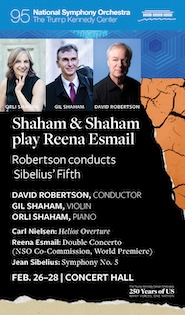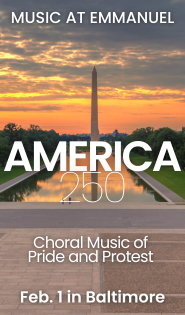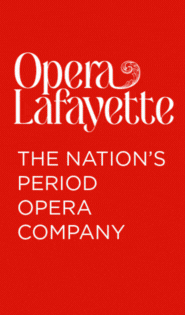Washington Concert Opera triumphantly returns with Rossini’s “Maometto II”
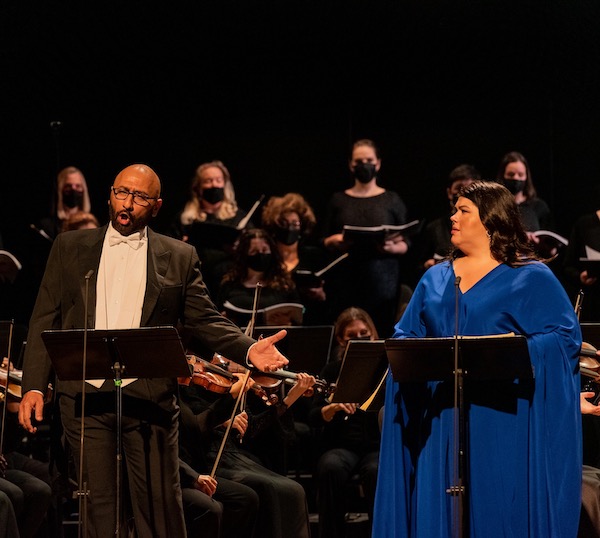
Ashraf Sewailam in the title role and Leah Crocetto as Anna performed in Rossini’s Maometto II, presented by Washington Concert Opera Sunday night at the Lisner Auditorium. Photo: Caitlin Oldham
Of all classical music genres, opera seemed likely to be the last to return as the world tries to get past the coronavirus pandemic. After nearly two years since its last live performance, Washington Concert Opera presented Rossini’s Maometto II Sunday evening, with an outstanding cast at George Washington University’s Lisner Auditorium.
Music director Antony Walker had long planned to perform the new critical edition of this opera, unveiled at Santa Fe Opera in 2012. This version, prepared by Hans Schellevis, is a recreation of Rossini’s original opera, premiered at the Teatro San Carlo in Naples in 1820. That debut was not successful; Rossini likely alienated his Neapolitan audience by making the opera so much about ensembles rather than traditional cavatina and cabaletta solo showcases. The composer revised the work, as L’assedio di Corinto, a rarity presented by the dearly departed Baltimore Opera in 2006.
The title character is based on Mehmed II, the Ottoman sultan who conquered Constantinople in 1453, when he was just 21 years old. Cesare Della Valle set his libretto in the 1470s, during the Ottoman siege of Negroponte (Chalkida in present-day Greece), the Venetian fortification that controlled the strait between Attica and the island of Euboea. In a non-historical twist, the Ottoman ruler has become the secret lover of Anna, the daughter of the Venetian leader, Erisso, much to the consternation of her father and her betrothed, the Venetian hero Calbo.
Walker shrewdly cast Bruce Sledge and Leah Crocetto as the father and daughter, both reprising their acclaimed roles in Santa Fe. Crocetto, last under review in WNO’s 2019 Otello, was a sensation as Anna. Her many virtuosic runs shimmered with clarity and precision, and she displayed consummate control of her tone, from demure sweetness to overwhelming power on explosive top notes.
In “Giusto ciel,” the solo moment in the middle of Rossini’s complex Terzettone in Act I, Crocetto murmured her whispered prayer with a velvety legato, accompanied delicately by harpist Eric Sabatino. She held the blazing high note with impeccable force and beauty at the end of Act I— just one of many examples of her potent top register.
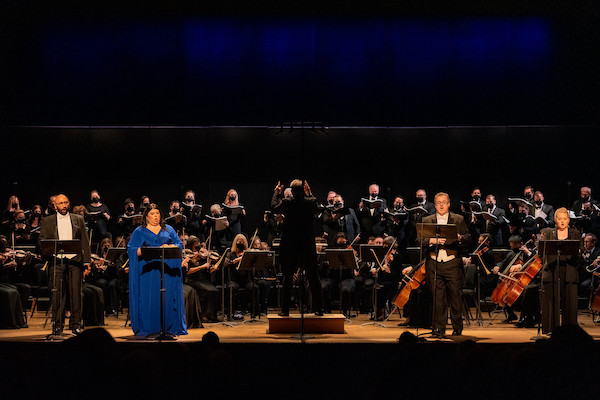
Photo: Caitlin Oldham
Tenor Bruce Sledge matched Crocetto with both heraldic power, from his first dramatic entrance in Act I, and expressive beauty. Sledge could not only hold his own against the full orchestra: he was also a sensitive partner in the many duos and trios with the higher voices, including the Terzettone, with its exquisite triple cadenza for the three singers.
Mezzo-soprano Elizabeth DeShong shone with a metallic low range in the trouser role of Calbo, the hothead who urges Erisso not to surrender to the Ottomans. She had to wait until nearly the end of the second act for her showpiece, “Non temer,” and then proceeded nearly to steal the show with thrilling passagework and impressive strength on her high notes as well. She paired seamlessly with Crocetto, especially in the florid double-melisma in the Act I trio “Mira, signor.”
Bass-baritone Ashraf Sewailam blustered and raged with impressive force as Maometto II, from the moment of his heroic entrance (“Sorgete, sorgete!”). His voice balanced nicely between a rich crooning tone and incisive fullness, with occasionally logy runs being the only weakness. He provided a solid foundation in his ensembles as well, rounding out the harmonic complexities of the quartet that ended Act I, with its web of overlapping lines.
The opening of Act II, where the women of Maometto’s seraglio attempt to persuade Anna to submit, provided some comic relief. There was further laughter at the subsequent duet of Maometto and Anna, as the sultan appealed to Anna’s love for her father. The possibility of surrender to the Ottoman army as a way to spare bloodshed was no joke, however. The real-life Negroponte did not accept the offer: during the ensuing three days of authorized mayhem, the Ottoman troops slaughtered almost all the men and enslaved the women and children.
Walker did not miss a beat in his return to the WCO podium, coordinating his forces with his usual confident authority, including the quick correction of a misalignment between the orchestra and Crocetto in Act II. Squealing piccolo and plenty of clanging cymbals and glockenspiel, both reminiscent of the Janissary music associated with the Ottoman military, added exotic touches. The menacing brass (limited to just seven of the ten players in the score) and strange dissonances signaled Maometto’s rage in his Act II aria “All’invito generoso.”
Walker presided over an orchestra and chorus that was smaller by comparison to pre-pandemic times, a choice made to accommodate social distancing between the masked musicians on the stage. The 23 string players produced a sometimes anemic, not precisely tuned sound, and the chorus of 30 seemed distant, the sound further muffled by the wearing of masks. Still, it was thrilling to experience the sound of grand opera and unamplified solo voices even if we are not back to full strength just yet.
Kate Lindsey stars in Berlioz’s arrangement of Gluck’s Orphée et Eurydice, presented by WCO 6 p.m. April 24, 2022. concertopera.org.

